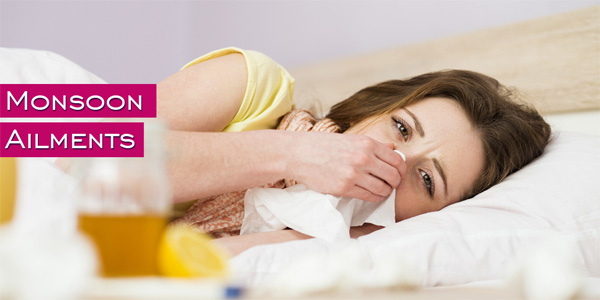We are halfway in the rainy season and are enjoying the occasional rain showers. Some are planning treks while others are looking for leisure trips at nearby getaways. Sounds great! However, the pleasant rains have also brought along a number of monsoon related illnesses. Are you aware and cautious about them?
Some of the common illnesses visiting in monsoon:
Common cold, cough and viral fever
It is one of the biggest reasons of major absenteeism in schools as well as offices. These viruses thrive in humid conditions and easily spread too.
Things to take care:
- Maintain high levels of hygiene by washing hands frequently so you don’t spread or contract viruses through contact with people.
- Avoid staying in wet clothes, always change or keep a spare set at work.
- Boost your immunity by eating nutritious foods.
Malaria
This ailment somehow takes the top place during the rainy season. Female anopheles mosquito cause malaria by breeding in dirty water. The common symptoms of malaria are fever, shivers, muscle pain and weakness. If untreated, it can lead to more hazardous consequences.
Things to take care:
- Stagnant water acts as a breeding ground for mosquitoes, so ensure your neighbourhood is kept as clean as possible.
- If you need to store water at home ensure that you cover it.
- Use mosquito nets, coils or incense and skin repellents to keep away from mosquitoes.
Dengue
Dengue fever is caused by the dengue virus found in certain mosquitoes. The common symptoms of dengue are fever, body aches, joint pain and rash. Keeping a check on the platelet count is needed as a low range needs urgent attention.
Things to take care:
- To avoid mosquito bites use insect repellents and cover yourself properly.
Leptospirosis
One of the most common monsoon ailments, leptospirosis is mostly caused by walking in dirty water. The chances of infection increases if you have skin injuries. This bacterial disease is spread by rats and symptoms include high fever and chills with severe headaches and body ache, followed by nausea, vomiting, diarrhea and abdominal pain.
Things to take care:
- Avoid exposing your feet to dirty, stagnant rainwater, especially if you have injuries.
Diarrhoea
This is another common ailment during monsoon, which is caused due to unhygienic consumption or handling of foods and water. When diarrhoea is caused by food contaminated with bacteria or parasites, it is often referred to this as food poisoning.
Things to take care:
- Avoid eating at unhygienic places and consuming uncovered foods.
- Maintain proper hygiene, wash hands before handling food and drink only boiled water.
We generally tend to self medicate at times and ignore poor health symptoms. However it is best to consult a doctor immediately. Do check our below link for appointments, contact number and various doctor details. We cater to all kind of patient issues minor and major.
https://www.kokilabenhospital.com/patients/makeanappointment.html
So be safe this monsoon by taking some small precautions. Happy Rains!


